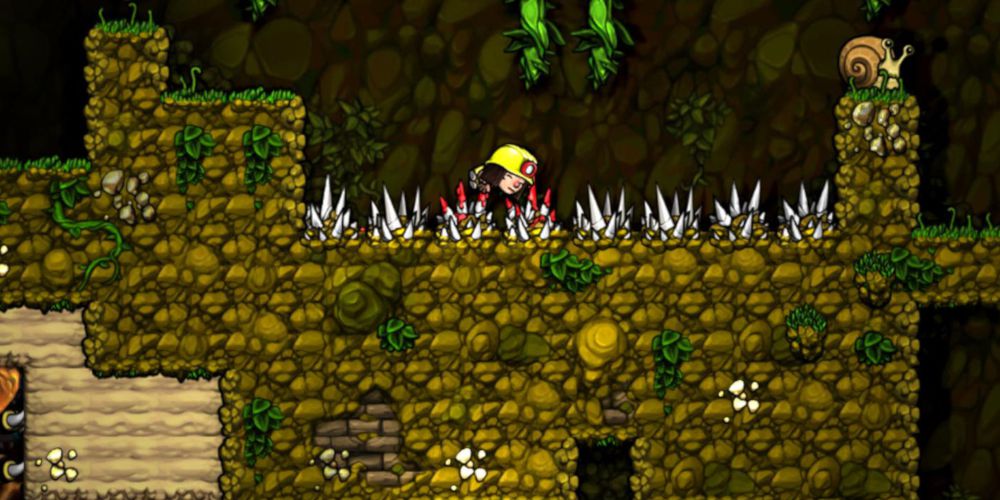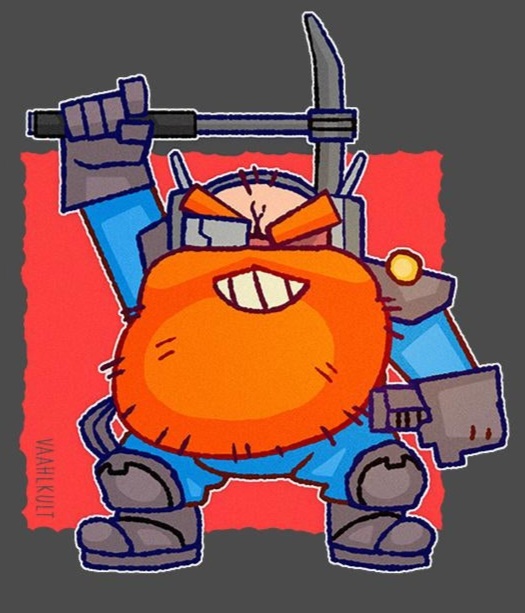My takeaway is that it’s only original Rogue fans that care about the delineation of the terms. Is there a modern (i.e. post 2000s game) that matches the definition of a roguelike as given in the article?
Here’s how I understand it:
Rogue-lite: has permanent upgrades that persist between runs.
Rogue-like: each run is unaffected by any previous run.
This is my preferred version. Anything else is overly specific on arbitrary features. It doesn’t matter to me if levels are procedurally generated or randomly chosen from 100 different hand made levels, the result is the same.
Pretty much, yeah. The genre was called “Rogue-like” because of Rogue, where your runs were all unique. “Rogue-lite” happened when devs wanted to add persistent progress to the game.
So basically Kingdom of Loathing is a Roguelite? Neat!
Whoa, what a nostalgia trip to pull out of nowhere lol
It’s actually still going strong! I started playing daily again a couple months ago after being away for years and it totally still holds up!
Rogue-like: each run is unaffected by any previous run.
I would tweak this slightly. Each run does not have upgrades that carry over into future runs, but you might unlock new characters to play or items to encounter.
I would call FTL a Rogue-like, but arguably a new run can be affected by a previous run if you’ve unlocked a new ship design.
Isn’t a Rogue-lite just a very small or indie sneaky game? :P
The conversation around the two really wears me out. IMO, there’s no need to be so restrictive. We can call them traditional roguelikes, platform roguelikes, whatever, and I think that’s fine. If anything, I think we should have better terminology to differentiate games where the runs are isolated and those where there is meta progression. I don’t think roguelite a good name for the latter.
The conversation around the two really wears me out.
Sorry! I came across a game and realised that there were two distinct terms that I had heard/seen over the years, and so I wondered what the difference was. Never come across discourse over it before, so that’s why I posted.
Nothing against you specifically! It would be more accurate to say that the people who will die on the hill of roguelike being something very specific wear me out. I certainly didn’t intent to make a dig at you, so sorry about that!
We can also just call them all rogue-likes. Everyone intuitively understands there’s a huge space in that by now, and the games can wildly differ. It’s fine. We know that no two MMORPGs are alike, and now two rogue-likes are alike.
Sure, that’s fine if people were actually specifying any sort of modifier. But calling everything a roguelike makes it hard to find the traditional roguelikes for those that like them. I’d be ok if the terms were standardized with modifiers like “Traditional Roguelike”, etc, but they aren’t. Everything with permadeath gets the label roguelike these days.
Roguelikes are a pretty specific genre of game that generally feature procedurally generated levels, permadeath, no meta progression, tile-based gameplay, hunger systems, randomized loot appearances, etc. Nethack is probably the best known example of a true roguelike.
Roguelights are a wide variety of games that feature some of the features of true roguelike but not all of them, most commonly procedural generation and permadeath, but most of them feature meta progression.
Honestly if you’ve ever played a true roguelike, the difference is immediately apparent. They’re usually not very similar at all. There’s just a very good chance that you’ve never played one, they’re not exactly wildly popular.
And just to stress: if a game features meta progression it is not a true roguelike. In true roguelikes, you start from zero every time.
This is how I’ve seen it. I only like the Lights usually because I enjoy meta progression. I feel like it makes the difference for me to feel like I’m not just wasting my time. I should also mention I’m pretty terrible at games so the meta progression helps me make progress where other games I’d be stuck too often.
I generally prefer rogue likes these days for the variety, but I do think meta progression can also make it feel like wasting your time in a different way. The game becomes gated by wasting enough time to unlock the rest, and doing so can feel more like an inevitability than an accomplishment.
I get that side of it. I honestly rarely play any games these days looking for feeling like a sense of accomplishment. I just play for an escape more than that.
I also enjoy some grindy games. So the meta progression can fit that for me. But I certainly agree it isn’t for everyone. That is what makes gaming so great. Usually something out there for everyone and it would get pretty boring if they were all the same.
And just to stress: if a game features meta progression it is not a true roguelike. In true roguelikes, you start from zero every time.
What about meta-unlocks? In FTL you can unlock different starting ships, but you will always start the same when starting with the same layout.
In Slay the Spire you unlock different cards you may be able to find, but you always start with the same deck.
That’s a good question, actually. I’ve played a fair bit of FTL and I do think it hews very close to the spirit of a true roguelike, since starting a game with the same ship is always the same experience. I do think meta unlocks change the way you play the game a bit, though, since you may target unlocks and achievements over victory. I’d ultimately put it on the “light” side, but I agree that the game skirts the line.
I haven’t played slay the spire, but I’m thinking of games like Binding of Isaac with a lot of unlocks, and I’d say that those change the game experience quite a bit depending on what you have unlocked.
They both have random generation of runs, doesn’t even have to be a dungeon crawler. The only difference is that a roguelite has meta-progression: you in some manner earn resources from each run that allow you to gain advantages on future runs
But does it have to be resources? What about unlocking a new character type, that can use different powers?
New characters are resources too. The word doesn’t have to be limited to spendable currencies like “lumber and gems”.
I’ve stopped using the word “roguelite” because most people who play roguelites just call them “roguelikes” and adding “lite” to the end makes it feel like those games are “lite” versions of roguelikes.
When I play Nethack, Dungeon Crawl Stone Soup, Cogmind, Brogue, etc. I call them “classic roguelikes” or “traditional roguelikes” which feels a lot more precise than having a distinction between “like” and “lite” and it also feels a lot less combative to “roguelites”. It feels like the term roguelite exists mostly to just correct people who incorrectly use “roguelike” and be like “unm, actually that’s not a roguelike 🧐 only my game is a roguelike 🤣”
Most people call roguelite games “roguelikes”; it should be on the fewer people who play traditional roguelikes to change what they call their oddly specific genre.
Also, for those who have never played a traditional roguelike, I highly recommend Brogue. It’s free and has much easier controls than most other old roguelikes, and the graphics are also pretty good for ASCII.Your method makes more sense to me.
The need to gatekeep a genre which - by now - I reckon has far more entries that don’t match the definition of a traditional/classic rogue-like game just seems unnecessary.
Giving a qualifier to ‘roguelike’ to delineate the classic versus more flexible/modern style makes more sense.
This should be higher up. Roguelite is a dead term imo. Language has evolved such that roguelike and roguelite are basically the same. The nuances change between every person you ask. So the debate is completely pointless. Just call them all roguelikes, and if you are referring to the traditional ones, call them as such. Traditional, classic, true, whatever.
If everyone treated it like you do, this wouldn’t be an issue at all. But these days everything with permadeath gets the roguelike label and that makes it hard to find the traditional roguelikes if you don’t already know about them.
Is it any easier to find roguelites instead of roguelikes, or vice versa? The terms are so similar, and everyone has a different definition, that any nuance when tag searching is lost. I respectfully disagree, I feel like anyone asking where to find traditional roguelikes knows where to find them better than finding roguelikes instead of roguelites, etc etc.
Spelunky lacked the spirit of a roguelike? Yeah that’s bullshit. It is the perfect spiritual successor and evolution to classic roguelike games.
It turns out that the genre is defined by permadeath and random generation, that’s about it. Everything else is merely nostalgia.
I’m convinced that your average hardline “Roguelike means strictly ‘like Rogue’” player would even leave Mystery Dungeon games off the list. It’s such a useless genre definition if you can only point to a handful of games that would even meet its criteria.
Ultimately it’s a term that has long exceeded its original use case. Maybe to some it feels like calling certain modern shooters “Doom clones” again, but it’s just not generally useful as terminology if the only games it “should” define are reskins of Rogue.
Caves of Qud, Ancient Domains of Mystery, Tales of Maj’Eyal, Cataclysm: Dark Days Ahead, and Dwarf Fortress Adventure Mode are all examples of modern games that meet the definition of a “traditional roguelike” - which is the term Steam uses to categorise games that are actually like Rogue, as opposed to games that just have permadeath and procgen.
However, dorks like the guy who wrote this article need to understand that language evolves. Roguelike doesn’t mean the same thing today as it did 30 years ago. There’s no problem whatsoever with games like Slay the Spire, Dead Souls and FTL being called roguelikes - you can see in an instant that these games don’t meet the definition of the traditional roguelike. The claim that this terminology is confusing or frustrating is just not true.
It absolutely blows my mind to see ADOM refered to as “modern”. Thank you, I feel less old.
However, dorks like the guy who wrote this article need to understand that language evolves.
When they tried to call things “Rogue-like-like” is where they lost me.
Dead Cells, as far as I recall. What a f****** awesome game.
Oh, and Hades, except that had a lot of dialogue, which this is saying true roguelikes don’t have. But f*** off, Hades is one of the best games in years.
Definitely Dead Cells covers all of those bullet points in the definition though, and I played that for about as long as I played Hades, 120 plus hours or so.
Hades would be considered Roguelite, doesnt mean its a bad game, its great.
This article doesn’t interpret the Berlin interpretation correctly. The things the article says are “must haves” are actually just “high value factors” as the post says.
This list can be used to determine how roguelike a game is. Missing some points does not mean the game is not a roguelike. Likewise, possessing some points does not mean the game is a roguelike.
So while some of these are deemed important to roguelike, it can be a roguelike without all of those things.
Now personally I think the debate over the genre is silly, and I don’t think the Berlin interpretation is really accurate anymore. But to be fair to it, it does not say a game has to have everything on that list. Spelunky is a roguelike. Idc what anyone says. Just because it isn’t turn/grid based doesn’t mean it isn’t a roguelike. It has most all the other high value factors, and a handful of the low value factors as well.
It’s fine if a game is categorised more specifically, the problem is people getting upset that something is a Roguelite and not a Roguelike.
It doesn’t matter, no genre is better than the other, your game isn’t by default worse because it’s a Roguelite and isn’t by default better because it’s a Roguelike, it’s just a genre definition to help people find similar games.I get that some might think they are too similar, but in that case we should just keep Roguelike and then define Roguelite games in a different way. At the moment a problem is games that have the ‘run’ gameplay, but nothing else like Rogue and then call themselves Roguelikes, but that’s like having a bonfire checkpoint system in a visual novel and calling it Soulslike.
As someone who is VERY aware of the over-specificitty of The Berlin Interpretation:
Generally speaking, nobody is saying a roguelike is worse. Just like DOOM is not worse than Operation Flashpoint because it is not a milsim. It just has to do with having criteria to indicate what games people might like if they liked others. And while there are a lot of borderline cases*, generally speaking, roguelikes and roguelites are very much built differently. Roguelites are very much built around “failure is progress” in the sense that, quite often, you actually need to fail a few times to unlock the endgame.
So when people are saying a game is “the wrong genre”… it can get annoying. It isn’t saying that Hades is worse than Stoneshard** but more that they are very different kinds of games.
*: For example, Tales of Maj’Eyal is NOT a roguelike. Maybe you don’t care about the aesthetics (I sure don’t) but stuff like the transmog bag and the unlockable classes and “races” very much disqualify it. But there is a reason it is one of the most loved games among the “roguelike” crowd. It is one of the best modernizations of the formula to ever be made.
**: Which also would not qualify. Which is stupid
Mmm yeah, The Berlin Interpretation is way too specific, things like the graphics/grid etc. If some game fits more than half the factors, perhaps that should be considered ‘like’ enough? But I do understand why people can get anal about some games being categorised as Roguelike when they are infact not very similar at all.
I think it boils down to genre being misused in general, there’s games with large open spaces called Open World, when they are not really, games that are called MMO when they are not. RPG games that are not actually RPG etc etc etc. Rogue fans just made a bigger deal out of it.
Well, a lot of that boils down to actually “putting in the effort” to have sane-ish distinctions (the bar is low). You’ll see similar arguments from the milsim crowd, for example. Same with a lot of flight sims where there are generally pretty well understood criteria for the different subtypes (even if it is a mess to find a way to refer to stuff like “Lock-On” that is not “arcadey”…). This isn’t “Well, it has a level up animation so I guess it is an RPG”. This is “It meets criteria X, Y, and Z so it is a roguelike. It meets only x and y, so it is a roguelike. Why do you keep bringing up Operation Flashpoint?”
Contrast that with something like FPSes where you can vaguely distinguish the different eras but there is a lot more bleedover to the point of (fucking stupid and borderline offensive name aside…) not actually being sure if DOOM 2016 is a “boomer shooter” because of the design decisions… even though DOOM is the gold standard for both 2016 and stuff like Dusk (actually Quake was, but DOOM markets better).
Like, I assume most of the crowd are too young to remember but there were actually REALLY big arguments over “MMO” back in the day. Maybe we all remember the question of “So… is Destiny an MMO?”. But there were a LOT of arguments over Guild Wars 1. Because it looked like an MMO and it even progressed like an MMO but… it was Diablo 2 with a fancy skin for the IRC chat room between instances. And a lot of people (kind of rightfully…) blame Guild Wars 1 for the mess that has resulted in “Diablo 4 is my favorite MMO”.
Which, getting back to Roguelikes/lites… as long as you listen to WHY something is not a roguelike, it is a really good distinction. If the reason involves progression mechanics then you almost immediately know if you care. And if it becomes one about aesthetics, you know nobody, not even the person bringing it up, really cares.
@verysoft@kbin.social
@NuXCOM_90Percent@lemmy.zip
Thanks guys, enjoyed your discussion.
Off the top of my head, pixel dungeon, golden krone hotel, caves of qud, cogmind, zorbus & tangledeep all fit the strictest definition IMO. Probably Jupiter hell and maybe spelunky too
For me at least, the definitions are:
A roguelite is a permadeath, generally procedurally generated game, generally with a metagame over the runs
A roguelike is that, but in addition it’s also a turn based dungeon crawler RPG. I’d say the metagame is a less common aspect with traditional roguelikes
I’ve heard that roguelites have progression between runs, which makes successive runs easier, while roguelikes usually don’t?
That’s the definition I’ve always heard too.
I think the confusion happens because like and lite sound similar. In another language I don’t think this would be a common confusion at all.
That’s what I’m referring to with the metagame parts, though you might be correct in that no true roguelike has this metagame aspect.
Personally, I like games that are actually similar to Rogue, because they’re basically puzzle games, but long-form and less strict.
I do also enjoy the games that are less similar to Rogue, as with a permadeath mechanic, they still usually present a puzzle (rapid rise in difficulty vs. finding the right strategy to keep up with it), but aside from that, they’re generally just less puzzley.
So, personally I do find the distinction useful. But to make it extra clear, I usually just say “traditional roguelike” when I mean a game actually similar to Rogue…
Sorry, but the people using the original definition are definitely the minority now. It’s just how language evolves, niche terms that get popular get generalized. Developers aren’t misusing the term because original rogue likes are just that popular, they’re misusing the term because the vast majority of their audience misuse the term and couldn’t give less of a shit about the original definition.
Don´t get me wrong, I don´t mean to gatekeep (I in fact play lites, not likes). However, a useful orientation when you want to know if a game is a like or not, is in my opinion the Berlin Interpretation
Yep, that’s the only answer that makes sense to anybody who actually plays and likes roguelikes.
As a rule of thumb I like say that if it needs a pause button it’s a 'lite. This doesn’t come close to covering the criteria but it’s a good shortcut to weed out a lot of them.











